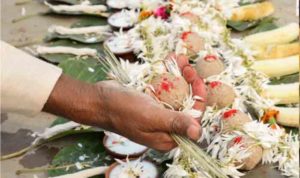According to legend, when the warrior King Karna died during the Mahabharata War and his spirit ascended to heaven, he was given meals of jewels and gold to eat instead of food. Realizing that hecouldn’t sustain himself on these items, he addressed the lord of heaven Indra and asked him why he wasn’t receiving real food.

Lord Indra then told him it was because he gave these items as donations his entire life but never donated food to his ancestors. To which Karna replied that he wasn’t aware of his ancestors. Hearing this argument, Indra agreed to let Karna return to Earth for a fifteen day period so he could make amends and donate food in his ancestor’s memory. A period of time which is now known as Pitru Paksha.
Customs, Traditions And Celebrations
During this time, the ritual of Shraddha is performed. This specifics of this ritual may be different from person to person, but usually it combines three components. The first part is Pindadan, the offering of Pinda to the ancestors. Pinda are rice balls that are usually made of goat’s milk, ghee, sugar, rice, honey and sometimes barley. The second part of the ceremony is Tarpan, the offering of water mixed with kusha grass, barley, flour and black sesame. The final part of the ceremony is Feeding the Brahmin. This is giving food to the Brahmin priests. Also during this time, it is considered auspicious to read from the Holy Scriptures.
However, there are also some things that must be avoided during Pitru Paksha. Participants are supposed to avoid engaging in new endeavors; eating non-vegetarian foods; shaving or getting haircuts; eating onions, garlic or eating junk food.
The Pitru Paksha Shradh commence on the Purnima or Full Moon Day (at times the next day) and conclude on Amavasya or the New Moon Day. The dark fortnight or 15 day period of the Bhadrapadh month as per Hindu Lunar Calendar is marked as Pitru Paksh Shradh and observed as an obeisance to ancestors.
As per Hindu religion, the Shradh of a departed elder should be performed every year on the date (tithi) and month of death of the deceased; however, if the date is not known then Shradh could be performed on the Amavasya of that month.
For Pitars or Ancestors, the Shradh Pitru Paksh period is considered as the right time and ‘tarpan’ is performed as a remembrance and respect to the antecedents. There are a total of 16 Shradhas on which the rituals should be performed preferably during the Kutup Muhurat or Rohina Muhurat
Shradh 2018 Dates:
Monday, September 24, 2018 Purnima Shraddha
Tuesday, September 25, 2018 Pratipada Shraddha
Wednesday, September 26, 2018 Dwitiya Shraddha
Thursday, September 27, 2018 Tritiya Shraddha
Friday, September 28, 2018 Chaturthi Shraddha, Maha Bharani
Saturday, September 29, 2018 Panchami Shraddha
Sunday, September 30, 2018 Shashthi Shraddha
Monday, October 1, 2018 Saptami Shraddha
Tuesday, October 2, 2018 Ashtami Shraddha
Wednesday, October 3, 2018 Navami Shraddha
Thursday, October 4, 2018 Dashami Shraddha
Friday, October 5, 2018 Ekadashi Shraddha
Saturday, October 6, 2018 Dwadashi Shraddha, Magha Shraddha
Sunday, October 7, 2018 Trayodashi Shraddha, Chaturdashi Shraddha
Monday, October 8, 2018 Sarva Pitru Amavasya


